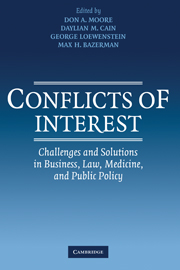Book contents
- Frontmatter
- Contents
- List of Contributors
- Acknowledgments
- Introduction
- PART ONE BUSINESS
- 1 Managing Conflicts of Interest within Organizations: Does Activating Social Values Change the Impact of Self-Interest on Behavior?
- 2 Commentary: On Tyler's “Managing Conflicts of Interest within Organizations”
- 3 A Review of Experimental and Archival Conflicts-of-Interest Research in Auditing
- 4 Commentary: Conflicts of Interest in Accounting
- 5 Bounded Ethicality as a Psychological Barrier to Recognizing Conflicts of Interest
- 6 Commentary: Bounded Ethicality and Conflicts of Interest
- 7 Coming Clean but Playing Dirtier: The Shortcomings of Disclosure as a Solution to Conflicts of Interest
- 8 Commentary: Psychologically Naive Assumptions about the Perils of Conflicts of Interest
- PART TWO MEDICINE
- PART THREE LAW
- PART FOUR PUBLIC POLICY
- Index
- References
8 - Commentary: Psychologically Naive Assumptions about the Perils of Conflicts of Interest
Published online by Cambridge University Press: 04 August 2010
- Frontmatter
- Contents
- List of Contributors
- Acknowledgments
- Introduction
- PART ONE BUSINESS
- 1 Managing Conflicts of Interest within Organizations: Does Activating Social Values Change the Impact of Self-Interest on Behavior?
- 2 Commentary: On Tyler's “Managing Conflicts of Interest within Organizations”
- 3 A Review of Experimental and Archival Conflicts-of-Interest Research in Auditing
- 4 Commentary: Conflicts of Interest in Accounting
- 5 Bounded Ethicality as a Psychological Barrier to Recognizing Conflicts of Interest
- 6 Commentary: Bounded Ethicality and Conflicts of Interest
- 7 Coming Clean but Playing Dirtier: The Shortcomings of Disclosure as a Solution to Conflicts of Interest
- 8 Commentary: Psychologically Naive Assumptions about the Perils of Conflicts of Interest
- PART TWO MEDICINE
- PART THREE LAW
- PART FOUR PUBLIC POLICY
- Index
- References
Summary
How problematic are conflicts of interest? As this volume documents, they are considerably more problematic than either those facing them or those vulnerable to them believe. In large part, people's misperceptions about conflicts of interest – which include the underestimation of their scope and the overestimation of the effectiveness of their purported remedies – reflect the public's psychological naivety about human motivation and human judgment.
To begin with, people are not good as they think they are at estimating how the opportunity for financial gain motivates people. Although there are many circumstances in which people err by assuming that material interest exercises more influence that it does (see Miller, 1999; Miller & Ratner, 1998), the most problematic cases of conflict of interest are those in which both parties, though especially the advisor, underestimate the influence of material interest on advice giving. As Cain, Loewenstein, and Moore's important chapter suggests, a wide range of psychological processes are implicated in this misjudgment.
People's naivete does not end with their assumptions about the need for addressing conflicts of interest, however. In their chapter, Cain et al. compellingly argue that people are also psychologically naive about the effectiveness of traditional remedies for the problems borne of such conflicts. The particular remedy they focus on in their chapter is disclosure. The rationale behind requiring advisors to disclose to clients that they have a material interest in the client taking a particular course of action – whether it is buying a particular stock or undertaking a particular course of medical treatment – is straightforward.
- Type
- Chapter
- Information
- Conflicts of InterestChallenges and Solutions in Business, Law, Medicine, and Public Policy, pp. 126 - 130Publisher: Cambridge University PressPrint publication year: 2005
References
- 5
- Cited by



